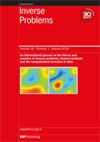关于不平等约束条件下的卡尔曼集合反演
IF 2
2区 数学
Q1 MATHEMATICS, APPLIED
引用次数: 0
摘要
集合卡尔曼反演(EKI)是最近推出的一种解决逆问题的优化方法,被广泛用于对未知参数进行高效、无导数的估计。特别是在涉及到条件不佳的逆问题和高维参数空间的情况下,该方案已显示出良好的成功前景。然而,EKI 的一般形式并不考虑约束条件,而约束条件是必不可少的,通常源于物理限制或特定要求。基于对数障碍方法,我们建议对 EKI 的连续时间公式进行调整,以纳入凸不等式约束。我们通过理论分析为这一调整提供支持,该分析为一般非线性前向模型提供了集合坍缩的下限和上限,以及向约束最佳值的收敛。最后,我们通过两个涉及偏微分方程的例子来展示我们的成果。本文章由计算机程序翻译,如有差异,请以英文原文为准。
On the ensemble Kalman inversion under inequality constraints
The ensemble Kalman inversion (EKI), a recently introduced optimisation method for solving inverse problems, is widely employed for the efficient and derivative-free estimation of unknown parameters. Specifically in cases involving ill-posed inverse problems and high-dimensional parameter spaces, the scheme has shown promising success. However, in its general form, the EKI does not take constraints into account, which are essential and often stem from physical limitations or specific requirements. Based on a log-barrier approach, we suggest adapting the continuous-time formulation of EKI to incorporate convex inequality constraints. We underpin this adaptation with a theoretical analysis that provides lower and upper bounds on the ensemble collapse, as well as convergence to the constraint optimum for general nonlinear forward models. Finally, we showcase our results through two examples involving partial differential equations.
求助全文
通过发布文献求助,成功后即可免费获取论文全文。
去求助
来源期刊

Inverse Problems
数学-物理:数学物理
CiteScore
4.40
自引率
14.30%
发文量
115
审稿时长
2.3 months
期刊介绍:
An interdisciplinary journal combining mathematical and experimental papers on inverse problems with theoretical, numerical and practical approaches to their solution.
As well as applied mathematicians, physical scientists and engineers, the readership includes those working in geophysics, radar, optics, biology, acoustics, communication theory, signal processing and imaging, among others.
The emphasis is on publishing original contributions to methods of solving mathematical, physical and applied problems. To be publishable in this journal, papers must meet the highest standards of scientific quality, contain significant and original new science and should present substantial advancement in the field. Due to the broad scope of the journal, we require that authors provide sufficient introductory material to appeal to the wide readership and that articles which are not explicitly applied include a discussion of possible applications.
 求助内容:
求助内容: 应助结果提醒方式:
应助结果提醒方式:


